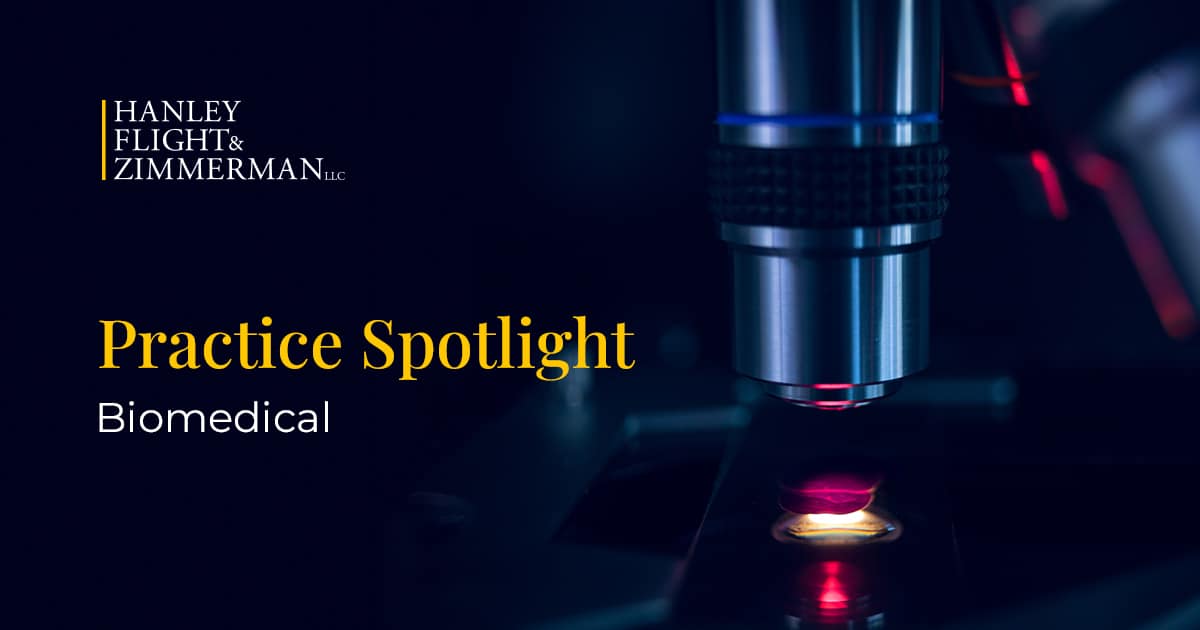The biomedical practice group at Hanley Flight & Zimmerman helps protect innovations in medical devices that are very important in everybody’s life, and increasingly more so.
A genre of technology that was once in the realm of laboratories and clinic settings is more likely to be in the hands of consumers. Quite literally. How many at-home Covid tests have you taken? Have you read a diagnostic test result on an app on your phone? Are you wearing a fitness tracker?
Large healthcare companies, including HFZ biomedical clients such as Abbott Laboratories and GE HealthCare, exhibit at CES, one of the largest consumer electronics trade shows in the world. HFZ’s biomedical expertise dovetails with our electrical and software practices to help our clients protect innovations in these exciting areas as more medical devices become consumer goods.
“I love working with our clients in the medical field,” said Joe Jasper, an HFZ attorney and one of the leaders of the biomedical practice group. “Some have consolidated work from other firms with us, which is confirmation that the feeling is mutual.”
In addition to consumer-facing devices, biomedical innovations also involve back-end analytics, such as applying machine learning models to data to predict patient conditions, patient outcomes, and develop treatment plans. In this space, data privacy is a key concern, as companies try to customize solutions to a particular patient and also leverage a large body of anonymized data to train artificial intelligence models. Innovations in this space balance maintaining the privacy of the individual with the benefit gained from analyzing a larger pool of data.
HFZ’s practitioners in the biomedical practice group include attorneys and professionals with degrees in biomedical engineering with an emphasis in electrical engineering, mechanical engineering, and bioinformatics. We also have practitioners with advanced technical degrees.
This multidisciplinary team brings a lot of value to biomedical patent applications, whether the innovation is for a laboratory, a clinical or point-of-care setting, or a consumer good. While some aspects of an invention focus on biomedical or healthcare principles, other aspects involve data analytics and software. Some inventions involve control of hardware as well. Having a multidisciplinary team of biomedical, software, and electrical engineers helps us to evaluate, describe, and protect all aspects of our clients’ biomedical and healthcare innovations.
“Our clients appreciate that HFZ is in tune with the latest practices in healthcare as well as in electromechanical hardware, software, and data analytics,” said Chris George, HFZ attorney and one of the leaders of the biomedical practice group. ”We can appreciate the many different, and sometimes opposing, concerns and challenges that go into these types of patent applications, and we strategically craft patent applications that survive examination and become assets for strategic use in licensing, joint ventures, and litigation.”
Given the nature of the technology and its target customers, biomedical patent applications face challenges from a statutory subject matter perspective as well as from a strategic value perspective, given that these technologies are often very personal and patient-centric in nature. These innovations may also guide the workflow of a human clinician. Having a software and computing background, and being able to understand the underlying principles of the technology as well as how to protect its personal nature, gives HFZ an advantage to strategically advise and obtain patent protection for our clients.
In this area, as well as with other technologies, HFZ provides clients with a high level of engagement to learn their businesses as well as their technologies and become familiar with the competitive landscape so that we can strategically prepare and prosecute patent applications into useful patent assets. We get to know patent examiners through interviews and USPTO-industry partnership meetings so that we have a productive dialog during examination. This engagement and context helps us to obtain patents that are robust and relevant and can be leveraged by the client.
“The biomedical space, and the broader healthcare realm, are intensely competitive and impact our lives and the lives of the people around us in ways that many other technologies do not,” Chris said. “At HFZ, we take that responsibility very seriously.”

